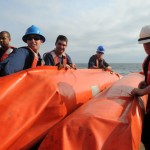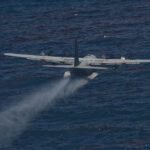As Congress grilled the principals of BP, Transocean, and Halliburton on Tuesday in an effort to identify where the responsibility lies for the millions of gallons of oil spewing into the Gulf, it was clear that no single company was going to accept the blame for the Deepwater Horizon oil spill.

In what could only be described as the “Shaggy” or “it wasn’t me” defense, Lamar McKay, Chairman and President of BP America whose company was leasing and operating the oil rig at the time of the explosion, pointed to Transocean, the owner of the rig, suggesting that that corporation should share in the responsibility for the accident. McKay pointed out that Transocean was in charge of installing the blowout protector which failed to activitate when the explosion occurred.
For his part, Steven Newman, Transocean’s CEO rejected that his company’s blowout protectors were the cause of the accident and he told senators that Halliburton, a third corporation should be held responsible, as they were contracted to provide construction materials and research at the well.
Halliburton’s president, Tim Probert, during the hearing quickly pointed the finger back to BP, indicating that his company was providing a service to the well-owner and is “contractually bound to comply with the well-owner’s instructions” on all performance-related matters. Probert referenced the failed Transocean blowout preventer as a principal cause for the spill following the explosion.

Meanwhile as the blame game persists, BP continues to search for other options to help stop the leak, following the failure of the 98-ton steel containment dome last Saturday. A build-up of crystallized gas in the dome or “big box” halted operations of the four story chamber.
In an effort to stop the gushing oil, BP is working on a smaller box, otherwise know as a “top hat” which the company plans on lowering over the leaking pipe by Thursday. BP has said that methanol will be injected into this smaller dome in an effort to keep the gas hydrates from clogging the system, as occurred in the “big box”.
BP is also considering another technique called a “junk shot” to plug the oil spill. This would entail pumping items such as golf balls and rubber in an effort to jam the leaking pipe, followed by cement to plug the leak. It is not clear whether such as operation will work, as the “junk shot” has not been attempted in depths of one mile under water.
BP has said that it will continue with its controlled burns, dropping of oil-dispersing chemicals, and moving booms into the Gulf in an effort to help contain the oil spill.
The Coast Guard and BP estimate that some 5,000 barrels of crude a day are entering the Gulf since the explosion occurred on April 22nd, but environmentalists believe that this figure is grossly underestimated. They estimate that 25,000 barrels a day are gushing into the Gulf or five times more than what is being said.
It is estimated that more than 4 million gallons of oil have poured into the Gulf since the accident.


